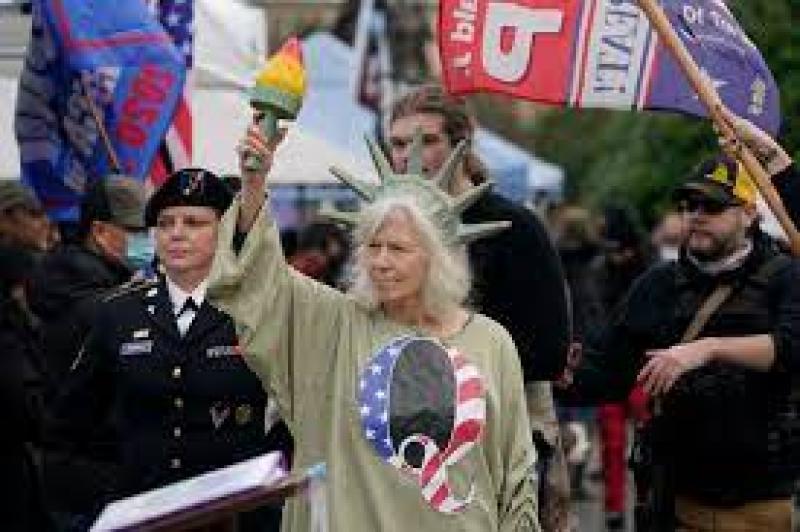Why would Christians embrace conspiracy theories?


Hat tip: Ozzwald.


A person dressed as Lady Liberty wears a shirt with the letter Q, referring to QAnon, during a protest on Wednesday, Jan. 6, 2021, at the Capitol in Olympia, Wash., against the counting of electoral votes in Washington, D.C., affirming President-elect Joe Biden’s victory. Several hundred people supporting then-President Donald Trump attended the rally. Ted S. Warren, Associated Press
When you think of someone who believes in conspiracy theories, who do you imagine? A loner, living in his parents’ basement, tapping away on a computer? If so, you need to expand your imagination — new research says there’s a good chance a conspiracy theorist is sitting next to you at church.
Around 4 in 10 religious Americans who are members of a local congregation believe the results of the 2020 election were not legitimate, according to the January 2021 American Perspectives Survey , a study conducted by the Survey Center on American Life, a project of the American Enterprise Institute based in Washington, D.C . Just under 1 in 5 accept the QAnon conspiracy theory that former President Donald Trump has been fighting a cabal of child sex traffickers led by Democrats and Hollywood elites.
Although white evangelicals seem to be particularly susceptible to conspiracy theories like these, they’re not the only people of faith who buy in. Eighteen percent of white Catholics and 15% of white mainline Protestants say QAnon’s claim about Trump is “mostly” or “completely” accurate, compared to 27% of white evangelicals, the survey showed.
The Rev. Mark Fugitt, who leads Round Grove Baptist Church in Miller, Missouri, and has been pastoring for 16 years, is one of many religious leaders who has noticed an uptick in conspiracy theory talk in their congregation.
In the past, he says he would occasionally hear from a congregant or two who held some unusual beliefs. But, in recent years, it’s happened more often.






Research shows that white evangelicals are more likely to believe in the conspiracy theory known as QAnon than any other religious group. Why?
Hey, Q-folk just want to be victims too.
Hmmm....
What is QAnon?
QAnon is a web of wide-ranging conspiracy theories that has gained increasing attention since 2016, when it came to public attention during the presidential campaign. It is propagated by someone referred to as “Q,” who claims to have access to insider information which is doled out to the public in bits and pieces known as “Q-drops” on social media sites. Among QAnon’s conspiracy theories — which have been widely debunked and discredited — is the idea that former President Donald Trump is fighting a global ring of child sex traffickers. Learn more here: What is Qanon ?
The Rev. Mark Fugitt, who leads Round Grove Baptist Church in Miller, Missouri, and has been pastoring for 16 years, is one of many religious leaders who has noticed an uptick in conspiracy theory talk in their congregation.
Members of his congregation have asked him when the Democrats are going to permanently shut down churches , a conspiracy that Trump shared on Twitter during the lead-up to the 2020 election. He’s also seen congregants circulating all kinds of conspiratorial content on Facebook, from the debunked idea that face masks are deadly to the false claim that George Floyd’s death was faked , as he told Religion News Service last year .
Members of his congregation have asked him when the Democrats are going to permanently shut down churches, a conspiracy that Trump shared on Twitter.
On the whole, Republicans are more likely to believe in conspiracy theories than Democrats, the survey showed. That’s significant because large shares of many white Christian faith groups identify as members of the GOP.
Still, white evangelical Republicans are more likely to buy into the sort of rhetoric peddled by QAnon than Republican counterparts who are not evangelicals, the January survey found. So there must be something about being religious, in general, and evangelical, in particular, that makes people susceptible to conspiracy theories, experts say.
Christians in general have been primed from birth to believe in the unbelievable.
One could argue that's true of most religions I suppose (?)